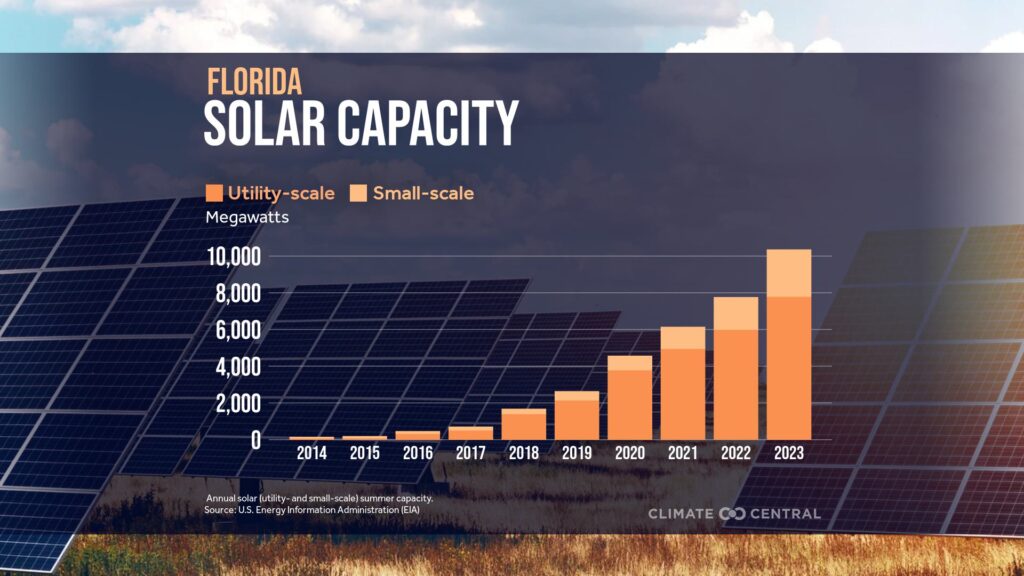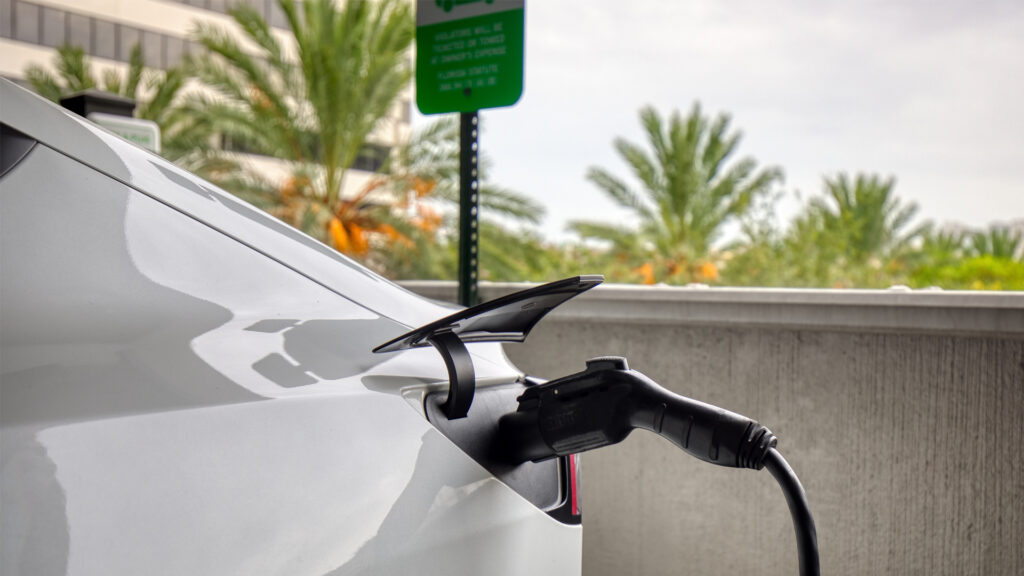By Laurie Mermet, The Invading Sea
Florida has established itself as a national leader in renewable energy adoption, ranking among the top five states for clean energy growth over the past decade, according to a new report from the Environment America Research and Policy Center.
In 2023, Florida generated more solar energy than it had in all the years before 2020 combined, the report found. The state produced 17,808 GWh of solar power last year, a big jump from 361 GWh in 2014, making Florida the third-largest solar producer in the nation.
Mia McCormick, an advocate with Environment Florida, noted that rooftop solar installations have increased by over 1,000% in the last five years, though the state is currently using only 2% of its solar potential.
“What we lack in energy policy, we make up for in public engagement,” McCormick said. “People in Florida are feeling empowered by getting their power from their own rooftop.”
The report from the research arm of Environment America, a federation of state-based environmental advocacy groups including Environment Florida, is supported by similar findings from other organizations.
Climate Central, a nonprofit group that researches and reports on the impacts of climate change, found that the Sunshine State’s solar capacity has increased from nearly zero in 2014 to about 8,000 megawatts by 2023. This surge in solar development has positioned Florida third nationally in solar growth, trailing only Texas and California.

“Some of the states that are running higher (than Florida) are places like Texas and California, and that’s just a population and a size thing, so I don’t necessarily know that they are doing anything more successfully,” said Jen Brady, a data analyst at Climate Central.
The state now generates enough solar energy to power 1.6 million homes annually, with most of this growth occurring in the residential sector.
“The fact that Florida is hanging so high with these very big states is pretty impressive,” Brady said.
Brady emphasized the state’s natural advantages.
“In a state like Florida, solar has a very high potential because you guys have a lot of sunshine,” she said. “So it’s just really well suited for a place like Florida.”
Environment America’s report shows the energy achievements of Florida extend beyond solar power. Florida ranks fourth in battery storage capability and has emerged as a leader in electric vehicle adoption, holding second place nationally for EV registrations.
With over 230,000 registered electric vehicles, Florida has also established itself as third in the nation for charging infrastructure, adding nearly 2,000 charging ports between 2022 and 2023.
McCormick stressed that the growth in renewable energy comes at a crucial time, as Florida faces increasing challenges from extreme weather events.
During recent hurricanes Helene and Milton, which left over a million residents without power, some Floridians with solar panels and battery storage were able to maintain electricity access, McCormick said.
However, the state faces several policy challenges. Florida has recently banned offshore wind development and removed its 100% renewable energy goal from law, along with references to climate change. Additionally, $105 million in federal funding for expanding EV charging infrastructure, received in 2022, remains undeployed.
McCormick said there are several opportunities for growth.

Florida is set to receive $350 million in federal funds for home energy rebates in 2025, which will help households improve energy efficiency. The state also maintains some supportive policies, such as sales tax exemptions for solar equipment and the absence of an EV license tax.
The EV license tax would require electric vehicle owners to pay a fee to the state to offset the revenue lost from fuel taxes that traditional vehicle owners pay when filling up at the pump. Although Florida doesn’t have one, McCormick expects it to be coming soon.
“The free market is driving the increase of electric vehicles on Florida roads. It’s certainly not the government,” McCormick said. She advocates for state leaders to better accommodate the growing clean energy sector and support Floridians seeking storm resilience through solar power and electric vehicles.
She suggested that additional policy support could help accelerate this transition and enhance grid resilience across the state, such as implementing a renewable portfolio standard that requires utilities to obtain a certain percentage of their electricity from renewable resources.
“Millions of Floridians are reaping the benefits of the clean energy progress we’ve made so far,” McCormick said. “With federal tax credits turbocharging clean energy and more extreme hurricanes expected in the years to come, now is the time for Florida’s leaders to lean in on renewables and ensure our energy system is more efficient and resilient.”
Laurie Mermet is a Florida Atlantic University senior majoring in multimedia journalism who is reporting for The Invading Sea during the fall 2024 semester. Banner photo: Solar panels on a rooftop in Florida (iStock image).
To support The Invading Sea, click here to make a donation. Sign up for The Invading Sea newsletter by visiting here.



